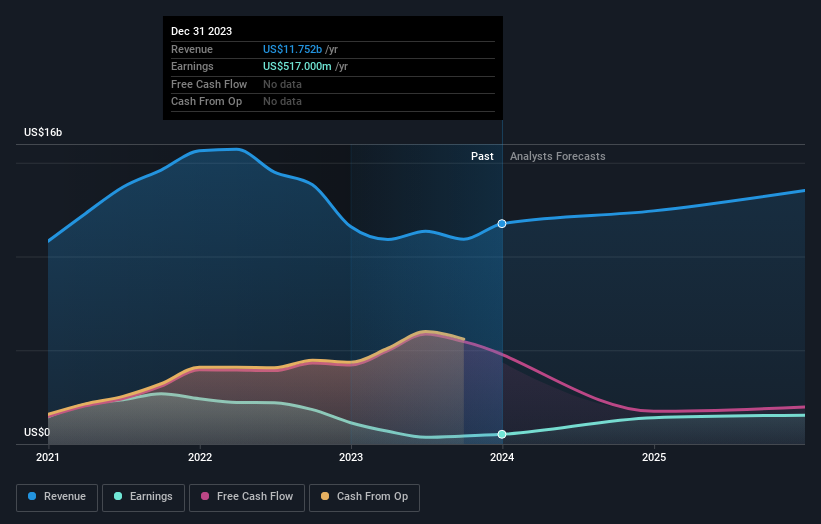Fidelity National Financial, Inc. Earnings Missed Analyst Estimates: Here's What Analysts Are Forecasting Now
Last week, you might have seen that Fidelity National Financial, Inc. (NYSE:FNF) released its full-year result to the market. The early response was not positive, with shares down 4.4% to US$50.06 in the past week. Revenue of US$12b surpassed estimates by 4.4%, although statutory earnings per share missed badly, coming in 37% below expectations at US$1.91 per share. This is an important time for investors, as they can track a company's performance in its report, look at what experts are forecasting for next year, and see if there has been any change to expectations for the business. We've gathered the most recent statutory forecasts to see whether the analysts have changed their earnings models, following these results.
See our latest analysis for Fidelity National Financial
Following the latest results, Fidelity National Financial's four analysts are now forecasting revenues of US$12.4b in 2024. This would be a modest 5.8% improvement in revenue compared to the last 12 months. Per-share earnings are expected to bounce 158% to US$4.88. Before this earnings report, the analysts had been forecasting revenues of US$11.4b and earnings per share (EPS) of US$4.44 in 2024. It looks like there's been a modest increase in sentiment following the latest results, withthe analysts becoming a bit more optimistic in their predictions for both revenues and earnings.
Althoughthe analysts have upgraded their earnings estimates, there was no change to the consensus price target of US$57.33, suggesting that the forecast performance does not have a long term impact on the company's valuation. That's not the only conclusion we can draw from this data however, as some investors also like to consider the spread in estimates when evaluating analyst price targets. Currently, the most bullish analyst values Fidelity National Financial at US$64.00 per share, while the most bearish prices it at US$51.00. With such a narrow range of valuations, the analysts apparently share similar views on what they think the business is worth.
Taking a look at the bigger picture now, one of the ways we can understand these forecasts is to see how they compare to both past performance and industry growth estimates. We would highlight that Fidelity National Financial's revenue growth is expected to slow, with the forecast 5.8% annualised growth rate until the end of 2024 being well below the historical 10% p.a. growth over the last five years. Compare this to the 123 other companies in this industry with analyst coverage, which are forecast to grow their revenue at 5.8% per year. So it's pretty clear that, while Fidelity National Financial's revenue growth is expected to slow, it's expected to grow roughly in line with the industry.
The Bottom Line
The biggest takeaway for us is the consensus earnings per share upgrade, which suggests a clear improvement in sentiment around Fidelity National Financial's earnings potential next year. They also upgraded their revenue forecasts, although the latest estimates suggest that Fidelity National Financial will grow in line with the overall industry. There was no real change to the consensus price target, suggesting that the intrinsic value of the business has not undergone any major changes with the latest estimates.
With that in mind, we wouldn't be too quick to come to a conclusion on Fidelity National Financial. Long-term earnings power is much more important than next year's profits. We have forecasts for Fidelity National Financial going out to 2025, and you can see them free on our platform here.
Before you take the next step you should know about the 2 warning signs for Fidelity National Financial that we have uncovered.
Have feedback on this article? Concerned about the content? Get in touch with us directly. Alternatively, email editorial-team (at) simplywallst.com.
This article by Simply Wall St is general in nature. We provide commentary based on historical data and analyst forecasts only using an unbiased methodology and our articles are not intended to be financial advice. It does not constitute a recommendation to buy or sell any stock, and does not take account of your objectives, or your financial situation. We aim to bring you long-term focused analysis driven by fundamental data. Note that our analysis may not factor in the latest price-sensitive company announcements or qualitative material. Simply Wall St has no position in any stocks mentioned.

